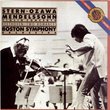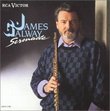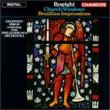| All Artists: Prokofiev, Previn, Lso Title: Romeo & Juliet (Comp) Members Wishing: 0 Total Copies: 0 Label: EMI Classics Release Date: 5/21/1996 Genre: Classical Styles: Ballets & Dances, Ballets, Historical Periods, Modern, 20th, & 21st Century Number of Discs: 2 SwapaCD Credits: 2 UPCs: 724356860728, 724356860759 |
Search - Prokofiev, Previn, Lso :: Romeo & Juliet (Comp)
 | Prokofiev, Previn, Lso Romeo & Juliet (Comp) Genre: Classical
The interpreter of Romeo and Juliet must be conscious of the deeper, more passionate expression--both brutal and tender--behind the brilliance of Prokofiev's score. He must also have a feeling for the dance, for as symphon... more » |
Larger Image |
CD DetailsSynopsis
Amazon.com The interpreter of Romeo and Juliet must be conscious of the deeper, more passionate expression--both brutal and tender--behind the brilliance of Prokofiev's score. He must also have a feeling for the dance, for as symphonic as this music is, its soul is rhythm. André Previn's 1973 reading with the London Symphony is warm, sensitive, and gorgeously played: here is a man who clearly knows something about love. The character of individual scenes is well caught, particularly that of the balcony scene. There is humor in the phrasing, and the tempos are indeed eminently danceable. Most appealing of all, the whole affair has a seductive ardor that can be felt in the treatment of even the smallest details. --Ted Libbey Similar CDs
Similarly Requested CDs
|
CD ReviewsGood Jason Amsden | Boston, MA United States | 06/13/2000 (5 out of 5 stars) "Prokofiev's ballet `Romeo and Juliet' is one of my favorite pieces of muisc. I have many versions including excerpts done by Myung-Whun Chung, Michael Tilson Thomas, Kurt Masur, Sir Georg Solti, and the complete ballet with Lorin Maazel. My most recent purchase is this version featuring Andre Previn conducting London Symphony. It was recorded in 1973 and the sound quality is excellent though sometimes you can tell when the engineers fiddle with the balance if you listen critically. For example, in the final scene of Act 2 where Romeo kills Tybalt I notice some problems, but not too bad. The tempos are generally all a lot slower than the tempos on the several versions I have, but they work extremely well most of the time. I find Previn's deathly slow tempo in the interlude between Scenes 1 and 2 of Act 1 exasperating, but I find the slower tempos in the fighting music very effective. I would recommend it over Maazel's with Cleveland, but the best solution is to get them both, of course! Maazel's is much more driven, bombastic you could say while Previn is more sympathetic though wild where necessary; he pays a lot more attention to the details in the score and the story. Maazel has better trumpets (most of the time) and Previn has better horns." Good but.... Peter Prainito | Lombard, IL USA | 05/08/2003 (4 out of 5 stars) "I consider Romeo & Juliet Prokofiev's masterpiece. I own many excellent recordings of music from this ballet so I am very familiar with different performances from which to judge the finest. While this complete recording with Previn and the London Symphony is fine, it is surpassed by the Cleveland Orchestra on London/Decca with Maazel. Simply put, the Cleveland Orchestra is a far superior ensemble with outstanding musicians. I can hear mistakes in the London Symphony (especially the trumpets) whereas the Cleveland winds are awesome. The London/Decca recording has much better sound as well. So while both orchestras play the music with panache, one needs to look no further than to the Cleveland Orchestra recording of Romeo and Juliet which is in a class by itself by virtue of it's outstanding performance and sound." One of the great ballet recordings. F. Adcock | Silsbee, Texas United States | 03/18/2004 (5 out of 5 stars) "Andre Previn made several ballet recordings for EMI in the '70"s. Most critics agree that this one is the best of those and has stood the test of time. Some may prefer the Maazel/Cleveland performance, with its fireworks and emphasis on brass. That recording surely holds a special place in my collection, but Previn reigns supreme in my book. The Russian flare with which Previn wields his baton is very pleasing, but he knows how to stir up excitment when needed. The horns, especially, make a tremendous impact. True, the sound is not as "in your face" as the Maazel/Cleveland recording is, but Previn makes up for it with character. The love music soars, with the LSO strings rising to the occasion; the street dances in Act 2 are given just the right touch of humor, creating a contrast to the fight music to come.Where Maazel wins is in the dramatic music, with the interplay of the brass sending shivers up one's spine. But where Maazel loses ME is in his choice of speeds. Some feel Previn is too slow, but light speed would be considered slow compared to Maazel.Ultimately, both of these recordings deserve a high place in any collection, but at times they sound so different that the artists seem to be performing different scores. So if spectacle and Technicolor sound is all that is needed, stay with Maazel. For balance, romance, and a complete sonic picture, stick with Previn."
|

 Track Listings (26) - Disc #1
Track Listings (26) - Disc #1












